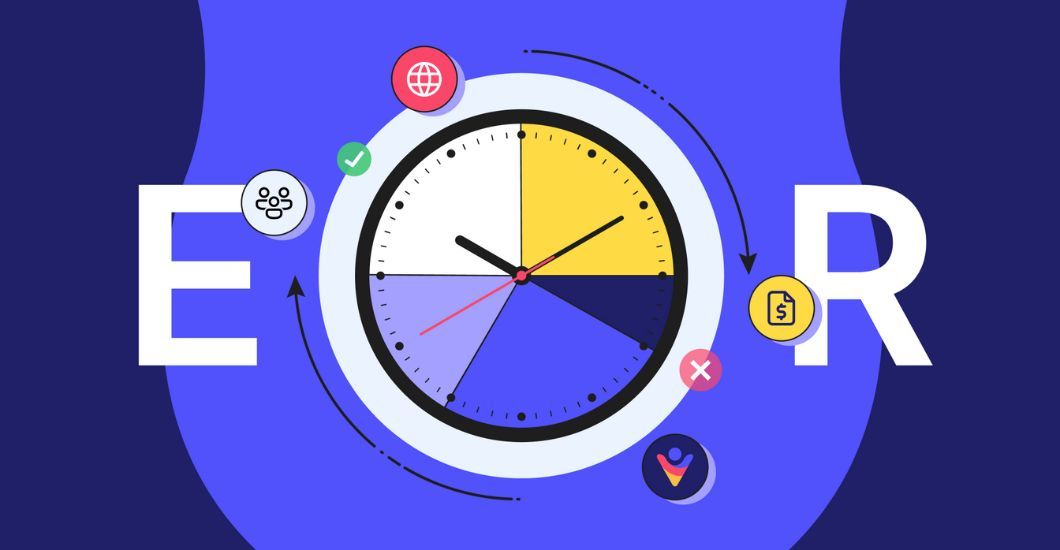Freelance Vs. Full-Time Employee – What’s The Difference?
Have you ever wondered how working as a freelancer differs from working for a company? You’re not alone. While both freelance and full-time roles have their own unique benefits and drawbacks, there are fundamental differences between the two that can significantly impact your career path, lifestyle, and income.
In this blog post, we will explore the pros and cons of each and the unique differences between being a freelancer and a full-time employee.
Whether considering a career change or simply curious about the differences, this post will provide valuable insights into both paths!

Freelancer vs. employee: Key differences
The rise of the gig economy has blurred the lines between traditional employment and freelance work. While both freelancers and employees provide services to businesses, there are significant differences in how they operate.
As a result, we have outlined all the key distinctions between freelance vs employee, so stay tuned!
1. Employment taxes
Employment taxes are a significant difference between freelancers and employees. When someone works for a company, their income taxes, medicare payments, and social security payments are usually withheld and paid by the company.
The employer also pays a portion of these taxes on behalf of the employee. However, freelancers must cover their own financial obligations, such as self-employment taxes, social security, and healthcare.
2. Employment benefits
Another significant difference between freelancers and employees is the availability of employment benefits. Benefits such as health insurance, paid time off, retirement programs, and other perks are commonplace in today’s workplaces.
Freelancers, in contrast, have to cover the expense of benefits out of their own pockets. For them, this can be a significant financial burden, especially regarding health insurance, which can be expensive and difficult to navigate.
3. Payment terms
Managing payment conditions is one of the many distinctions between freelancers and employees. In addition, the primary benefit of having a full-time job is the financial stability that comes from receiving a paycheck consistently every pay period.
In the world of freelance work, this is not the situation. When you’re a freelancer, you get paid whenever your work is done. Freelancers typically work on a project basis and are paid upon project completion or milestone completion.
4. Working hours
Working hours are a major difference between freelancers and employees. Freelancers are not constrained to the 9-5 schedule of a workplace, as is the case with full-time employees.
Part-time or full-time workers are subject to regular in-person attendance requirements at a predetermined workplace. Freelancers, on the other hand, have more control over their schedules and can pick and choose when and where they put in their time.
5. Cost differences
Hiring an employee comes with additional costs beyond their salary, such as benefits, insurance, and payroll taxes. However, freelancers usually work on a project-by-project basis without access to benefits or other advantages offered by their employers.
On the other hand, freelancers typically charge higher hourly rates or project fees to make up for the lack of benefits and the additional expenses involved with running their own businesses.

Pros of freelancing
From the ability to set your schedule and choose your clients to the potential for higher earning potential and a greater sense of personal satisfaction, there are many advantages to pursuing a freelance career.
Whether you’re considering switching from full-time employment or just curious about the benefits of freelancing, this section will provide valuable insights into the positive aspects of this type of work arrangement.
1. Managing your own business
If you think like a business, freelancing could be the perfect fit for you. Your projects and clients are entirely up to you, unlike when you work for a company where your duties are assigned.
What’s more, you get to set your rate for compensation based on the scope of the job, the expertise required, and the time invested.
You’re the boss, so it’s up to you to establish the hours you’ll be working and the structure of your company to suit your needs best. Being a freelancer grants one enormous freedom.
2. Working from home
As a freelancer, you don’t have to worry about being called back to the workplace, so you can enjoy the perks of working remotely every day.
As a result, you won’t have to deal with the usual workplace annoyances like long commutes, clogged roads, expensive clothing, and meals. Another perk of freelancing from home is the flexibility to set up a cosy office area of your own design.
Freelancers have the freedom to create a workspace that meets their requirements and preferences, which can enhance their general well-being and job happiness.
3. Flexibility
The freedom to set your own schedule is a major perk of the freelance lifestyle. Freelancers have more control over when and where they work, resulting in a more satisfying work-life mix.
As a result, you won’t have to bother your boss with a request for time off whenever you need to take care of personal business or follow a hobby. You won’t have to put up with a demanding manager or an annoying coworker any longer.
As an added bonus, you can take on as many tasks as you feel comfortable with, greatly increasing your earnings potential.
4. Choose the clients you want to work for
One of the greatest advantages of working as a freelancer is the freedom to choose the clients you take on.
When you labour for a business or another individual, you cannot choose which clients you serve. Instead, you’re typically just handed a customer, no matter how unpleasant or unprofessional they may be.
However, when working as a freelancer, you can shape your company in a way that attracts the customers you’d most like to work with.
5. Have unlimited earning potential
The possibility of financial success as a freelancer is uncapped. Your earning potential is boundless if you’re not limited by a set wage each year.
The freedom to establish your own prices can pave the way to financial success, provided there is a market for your goods or services. The amount you make as a freelancer depends on the demand for your skills.
As a result, the more value you can offer, the more money you can earn. Using a method like this will motivate you to find ways to enhance the quality and productivity of your service.

Cons of freelancing
While freelancing offers many advantages, it also comes with its own set of challenges and drawbacks. If you are interested in becoming a freelancer, it’s essential to understand the potential downsides of this type of work arrangement to make informed decisions about your career.
In this section, we will explore some of the cons of freelancing, so keep reading!
1. Work-life balance
Freelancers often struggle with maintaining a healthy work-life mix. Due to the fact that they are in charge of their own workload, freelancers frequently work late into the night or on the weekend in order to meet client deadlines.
This can strain their personal life and the connections they have outside of work, ultimately leading to burnout.
Freelancers may experience constant pressure if they cannot establish firm boundaries between their work and personal lives. Maintaining a healthy work-life balance requires discipline, good time management skills, and setting clear boundaries.
2. Loneliness
Being a freelancer is often solitary work. It’s not like working in an office where there’s constant noise and people, and there aren’t even any coworkers.
Regular office employment allows you to meet and get to know your coworkers regularly. As a freelancer, you may find that you only see the people you live with and your clients on a regular basis.
Since freelancers typically work alone, they may not have as much social contact as they would in a more traditional workplace, making freelancing a potentially isolating profession.
3. It takes time to build contacts and clients
Constructing a reliable clientele base is essential to any successful business, but it can take time when you’re freelancing.
As a freelancer, you must actively seek out new projects and customers, unlike in a conventional job, where you may have a steady stream of work from your employer. In addition, freelancing can feel like an uphill fight when you’re just starting.
No one knows who you are, what you do, or if they can trust you. This can be a time-consuming process, as you have to put in the effort to network, market your services, and build a reputation.
4. Taxes can be challenging
Self-assessment and tax payment can be complicated for first-timers who operate as freelancers. It can be time-consuming and require specialised knowledge for freelancers to maintain accurate records of their income and expenditures throughout the year.
In addition, self-employment taxes, which freelancers must cover, are more complex and costly than regular payroll taxes.
In contrast to regular workers, freelancers must pay their own income taxes, self-employment taxes, and any state or municipal taxes that may be due. Furthermore, tax laws and regulations can be convoluted and frequently updated, making it challenging for freelancers.
5. Too many responsibilities
When you’re a freelancer, bringing in business is up to you. That means promoting yourself in order to gain exposure, customers, and work. Marketing, networking, billing, and financial management are all part of this category.
Administrative duties, such as drafting contracts and checking for tax and legal conformance, are also the responsibility of freelancers.
This can be time-consuming and distracting, distracting you from more important tasks. With so many responsibilities, freelancers can easily become overwhelmed and find it challenging to balance their workload.

Pros of working as a full-time employee
A full-time job offers many benefits, including a regular paycheck and health insurance, and the chance to advance one’s position within an organisation. Additionally, full-time employment often provides structure and routine that can benefit some individuals.
In this section, you’ll learn about the perks of having a regular 9-to-5 job.
1. Fixed salary and benefits
The monthly salary promised in a full-time job contract is guaranteed by law and cannot be reduced. You will be paid a consistent monthly sum regardless of how many hours you put in, making it easier to plan for and manage your financial obligations.
This is beneficial for your professional life as well as other areas of your life.
When you have a reliable source of money, you can confidently plan for the future and stick to your budget. You can also anticipate a bonus or pay raise as the company’s revenue grows, provided your job history can be verified.
2. Paid time off
Employers are obligated to provide compensated vacation time for full-time employees. Employers must provide at least the minimum amount of leave time specified by law, though the specifics of this requirement vary by nation and by type of company.
Some companies will provide more paid time off than others, depending on a variety of factors such as the employee’s length of service, their position within the business, and the terms of their employment contract.
This ensures that workers can take needed breaks without fear of financial or professional repercussions. Furthermore, vacation time can provide a welcome break from work, relieving tension and preventing burnout.
3. Ability to collaborate with a team
In a team-based workplace, employees complement one another’s weaknesses while working together to achieve a common objective. Successful collaboration often leads to improved communication, increased efficiency, and higher productivity.
Strong working relationships and good team culture can boost employee satisfaction and retention when developed through collaborative efforts.
Close professional bonds can form when one works with one another regularly. Making connections with people at work can help you advance in your current position and open doors to new opportunities in your field.
4. Retirement plans
Full-time employees greatly profit from retirement plans because they ensure a steady stream of money in retirement. Workers can secure their financial future after retirement by setting aside a part of their salary in a retirement plan.
The value of a retirement plan can be boosted over time by the tax breaks and employer payments included in many plans.
Employees can protect their nest eggs and lessen the likelihood of running out of money by contributing to a retirement plan. In addition to providing benefits during and after retirement, retirement plans help foster long-term planning and fiscal accountability.
5. Benefits and perks
When it comes to workers’ well-being, companies must provide primarily social security benefits. Paid sick days, private healthcare, and other welfare benefits are just a few advantages employers can provide.
Although these can differ, at the very least, employers will provide sick pay and establish return-to-work policies for those absent from work for an extended period.
Most significantly, businesses that employ people full-time can rest assured that they will be covered in the event that their work needs time off due to an accident or illness.

Cons of working as a full-time employee
Working as a full-time employee is often viewed as a stable and secure option for many individuals, offering a regular paycheck, employee benefits, and a clear career path. However, this type of work arrangement also comes with its own set of challenges.
So, if you are considering a full-time position, read on to learn more about the potential downsides of this career choice.
1. Stuck in a routine
The enemy of full-time employment is, without a doubt, routine. The stability of a regular paycheck can make workers complacent, leading to an unmotivated team, no ambition for advancement, and a lifeless job.
Working for the same business for many years can lead to complacency and a lack of curiosity about other opportunities.
As you repeat the same tasks over and over again, the job could become tedious. Improve your abilities and take on new, more challenging tasks at work to prevent career stagnation.
2. Ours are defined by the employer
One potential downside of being a full-time employee is that the employer, rather than the employee, determines the scope and nature of one’s labour.
Because of this, employees may lose interest in their work and become dissatisfied if they cannot exercise their own discretion and ingenuity.
Furthermore, employees may be evaluated and measured in ways that put company objectives ahead of their own personal development. The inability to make decisions and act independently is a major drawback for some employees.
3. Inability to choose projects
Employers who provide full-time employment typically have well-established hierarchies, structures, and workload management practices, despite the fact that there is no universally accepted formula for full-time working hours or workloads.
This means you will not have as much control over where you put your talents to use as you would if you were a freelancer or contract worker.
Because of this, employees may lose interest in their jobs and become less committed to their work. Not having control over which tasks you work on can also hinder your professional development.
4. Clashes in the workplace
Workplace conflicts are a frequent source of stress for employees and can have a negative effect on morale and output. Tension and stress can develop among coworkers when disagreements occur due to differences in personality, work style, or values.
This can have a detrimental impact on morale, productivity, and collaboration in the workplace.
Long-term issues, like a breakdown in confidence and communication and even employee turnover, can be triggered by conflicts that aren’t resolved. Overall, conflicts at work can be a major drawback of a full-time job, with negative effects on individual and collective achievement.
5. Balancing family life
When you work full-time, you probably won’t have as much spare time as you would with part-time employment or as a freelancer, making it harder to strike a healthy work-life balance.
Try working intensely on your duties without any personal distractions, such as your cell phone, to make sure you still have time to take care of your family, participate in your hobbies, and meet up with friends.
This will allow you to accomplish everything on your to-do list during regular business hours and devote the remainder of your day to leisure activities.

To wrap up
The differences between freelancing and full-time employment are significant, and each type of work arrangement has its own advantages and disadvantages. Ultimately, the choice between freelancing and full-time employment will depend on individual preferences, career goals, and financial needs. It’s essential to carefully weigh the pros and cons of each option in order to make an informed decision about your career path.
FAQs
Can I be a freelancer and have a full-time job?
Yes, you can be both, unless your employment contract restricts outside work. Many people freelance on the side to earn extra income, gain experience, or explore new fields, as long as there's no conflict with their main job.
Is freelancing better than a full-time job?
Freelancing isn't inherently better — it's different. Freelancers get flexibility and independence but face income instability and no benefits. Full-time jobs offer stability, set hours, and benefits. The best choice depends on your priorities.
Does freelance count as being employed?
Freelancing is considered self-employment. You're not a traditional employee, but you are working and earning income. For taxes, insurance, and legal purposes, freelancers are classified as self-employed or independent contractors.
Is freelance part-time or full-time?
Freelance work can be either. You're not tied to fixed hours — it depends on how much work you take on. Some freelance part-time while studying or working a job; others freelance full-time as their main career.
